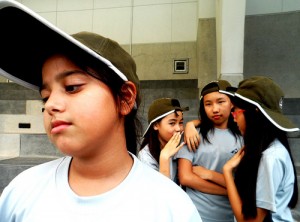“Why do you take everything so seriously? It was just a joke!”
“Where’s your sense of humour?”

“It was just a game.”
“That’s just kids being kids. It’s how they have fun.” (Or substitute “girls” or “boys” for “kids”).
All of these statements have one thing in common — they are typical responses from bullies (or their parents) when confronted with their wrong-doing. In dismissing it all as a joke, they are doing two things that are tip-offs to bullying:
- they are showing a lack of remorse for the hurt they caused;
- they are blaming their targets for feeling hurt and daring to articulate it.
All of this tends to make the kids targeted by bullying feel even more victimized. They are rendered totally powerless, and their hurt is discredited and delegitimized.
Saying those words alone does not make it bullying, however. There are other aspects to bullying, including its repetitive nature and the power imbalance between the parties involved. But this hallmark dismissal of someone’s feelings is a particularly cruel stroke, a manipulative flourish to cap off the mean act, words or gesture.
They are designed to hurt. And they do. The hurt comes from the further disempowerment, the insult added to the injury.
It’s important to recognize these words as red flags, whether you are a parent, teacher or child care worker. If your child comes home from school complaining of being blamed unfairly for a fight with another kid, and excuses his actions by saying “it was just a joke,” listen carefully. They might have been misunderstood (these things can happen), but it can also suggest the kind of manipulative behaviour that requires intervention before it worsens.
It can be hard for teachers and principals to see past this when confronted with it in the middle of a hectic school day. It can be tempting for parents of kids who bully to buy into their children’s defences. Those are some of the challenges we face in bullying prevention. But recognizing the words for what they are is a really critical first step.


